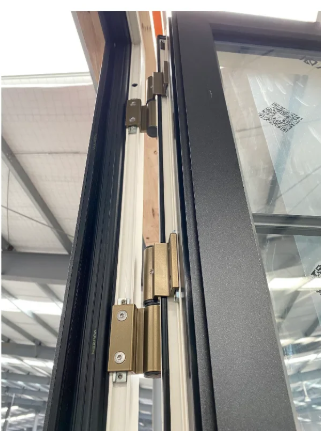Aluminium window hinges play a crucial role in window hardware, and their prices vary due to multiple factors. When selecting the right product, buyers should not only focus on price but also understand the key factors that influence costs. Below are the main factors determining aluminium window hinges price:

1. Material Quality
The primary material used for aluminium window hinges is aluminium alloy, and different grades of aluminium alloys have varying strength, corrosion resistance, and durability.
- Standard Aluminium Alloy (e.g., 6063 Aluminium Alloy): Relatively lower in price, suitable for general household windows.
- High-Strength Aluminium Alloy (e.g., 6061, 7075 Aluminium Alloy): Offers greater strength and corrosion resistance, making it more expensive, commonly used for high-end windows or special environments.
- Aluminium-Magnesium Alloy, Aluminium-Zinc Alloy: Some high-end products incorporate magnesium or zinc to enhance hardness and oxidation resistance, increasing costs.
2. Manufacturing Process
The manufacturing process of hinges directly impacts their durability and cost.
- Casting vs. Extrusion:
- Casting: Lower cost but may have air pockets, resulting in relatively weaker strength.
- Extrusion: Enhances hinge strength but comes with a higher production cost.
- CNC Precision Machining: Some high-end aluminium window hinges use CNC machining to ensure accuracy and improve quality, which also increases the price.
- Stamping & Welding Process: Suitable for mass production, offering lower costs but less durability compared to CNC-machined products.
3. Surface Treatment
Surface treatment affects both the appearance and durability of hinges. Different surface finishing techniques impact costs:
- Anodizing: Improves corrosion resistance and enhances aesthetics, with a moderate price.
- Electroplating (e.g., Nickel/Chrome Plating): Enhances wear resistance and oxidation resistance but comes at a higher cost.
- Powder Coating: Available in various colors, improving weather resistance at a reasonable price.
- Brushing/Polishing: Enhances texture but may slightly increase costs.
4. Size Specifications
The size and thickness of hinges directly determine the amount of material used, affecting pricing.
- Small Size (50mm-75mm): Suitable for small windows, lower price.
- Medium Size (100mm-125mm): Fits most standard windows, moderate price.
- Large Size (150mm and above): Offers greater load-bearing capacity, often used for floor-to-ceiling windows or large sliding windows, with higher costs.
5. Load-Bearing Capacity
Different hinges have varying load-bearing capacities, impacting their internal structure design and material costs.
- Light-Duty (5-10kg Load Capacity): Suitable for ordinary household windows, lower price.
- Medium-Duty (10-20kg Load Capacity): Fits most aluminium windows, moderate price.
- Heavy-Duty (Above 20kg Load Capacity): Designed for large floor-to-ceiling windows or curtain wall windows, requiring thicker materials or special designs, leading to higher prices.
6. Order Quantity and Logistics Costs
- Bulk Purchasing: Larger orders generally receive lower unit prices, while small-batch purchases have higher costs.
- Logistics Costs: Shipping methods (sea freight, air freight, express delivery) and import duties affect the final price when exporting to different countries.
Conclusion
Aluminium window hinges price is influenced by various factors, including material, manufacturing process, surface treatment, size, and load-bearing capacity. When purchasing, it is essential to consider specific usage needs, budget, and supplier quotations to ensure the best value for money.
